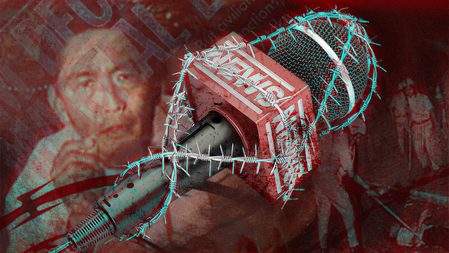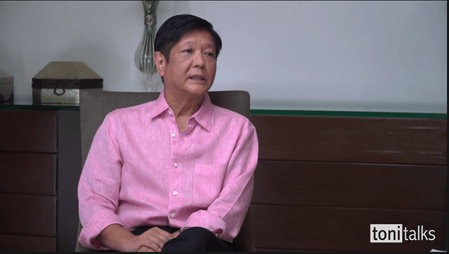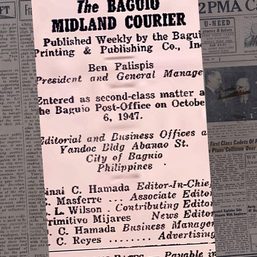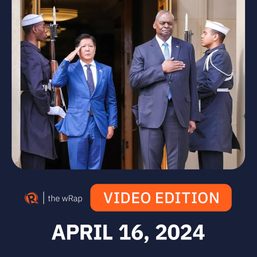SUMMARY
This is AI generated summarization, which may have errors. For context, always refer to the full article.
![[New School] The greatest lesson Bongbong Marcos learned from his father](https://www.rappler.com/tachyon/2021/09/NS-bongbonglesson-640.jpg)
New School features opinion pieces by young writers, highlighting youth issues and perspectives.
It almost seems fitting that, only a few days from the 49th anniversary of Martial Law, the Marcoses have once again captured the attention of the Filipino public. When I heard that Toni Gonzaga – whose family had long been trying to worm its way through to the political scene in Taytay, never shying away from bumping elbows with the Duterte crowd in order to garner the administration’s support (with mixed electoral success) – had published an interview with Bongbong Marcos, of all people, I knew nothing good could ever come of it. Seeing the dictator’s son talk about his father as if he were some martyr and his mother as if she were anything but a delusional old woman with an edifice complex left me with a foul taste in my mouth.
For 35 years now, the Marcoses have managed to postpone their day of reckoning. They may have lost their battles in the courts (to little effect), but they are winning the court of public opinion. A complex machinery of lies and propaganda has worked tirelessly to rehabilitate the reputation of the Marcos dynasty. In refusing to recognize the proverbial elephant in the room and asking the questions that would have come naturally to any journalist, Gonzaga did little more than play into the historical revisionism propagated by the Marcoses. Woefully out of her depth, Bongbong played her like a fiddle. Clearly, the dictator’s son has learned more than just a few tricks from his father. He’s certainly learned how to put on a good performance.
![[New School] The greatest lesson Bongbong Marcos learned from his father](https://img.youtube.com/vi/q2JczBOk8dQ/sddefault.jpg)
Contrary to claims that he was “too young” to remember Martial Law, Bongbong and his siblings had been well-aware of the inner workings of the Marcos dictatorship and played crucial roles in shaping public perception of the presidential family throughout the 1970s. By his own admission, Bongbong would sit in at his father’s Cabinet meetings as a boy. Groomed as his father’s heir since day one, the young Marcos began his political career at the tender age of 23. His short but expensive stay at the Wharton School of Business – complete with a $10,000 monthly allowance and a luxury estate paid for by government funds from the Philippine National Bank and 15 offshore bank accounts in the United States – was cut short upon his election as Vice Governor of Ilocos Norte in 1981. He would take over as governor of the province from 1983 to 1985.
After sequestering a number of the largest telecommunications firms in the country, Marcos appointed the then 27-year-old Bongbong chairman of the Philippine Communications Satellite Corp (PhilComsat) in 1985, during which US auditors claimed he had a monthly salary of anywhere between $9,700 to $97,000, or roughly ₱1.2 million to ₱12 million today, adjusted for inflation. Marcos’ telecommunications empire had funneled “tens of millions of dollars” over a 10- to 15-year period, much of which has yet to be recovered.
Lavishness stood in stark contrast with the sorry state of the rest of the country. As the national debt ballooned from ₱2.4 billion in 1965 to over ₱192.2 billion by 1985, the Marcoses and their associates lined their pockets with plunder and patronage. While the nation struggled with inflation and Filipinos went hungry, family and friends celebrated at the presidential yacht, with a starry-eyed Bongbong singing his own rendition of “We Are the World” – an apt analogy for how the Marcoses saw their family.
The early months of 1986 were the beginning of the end for the Marcos dictatorship. A sudden dare led to a surprise election marred by controversy and allegations of electoral fraud. Conflicting results from the Comelec (Commission on Elections) and Namfrel (National Citizens’ Movement for Free Elections) saw both Marcos and Aquino proclaim their victory. The dictator cried foul. Following in his father’s footsteps, Bongbong would go on to file his own electoral protest after narrowly losing the vice presidency to another yellow-clad widow – Leni Robredo.
When it became increasingly clear that US support for the regime was beginning to waver, and that the movement in EDSA was becoming more than just some simple protest, Marcos began sending in government troops to disperse the crowds gathered to topple the aging dictator. Fabian Ver had been drawing up plans for an attack on the rebel positions at Camp Crame and Camp Aguinaldo, where RAM (Reform the Armed Forces Movement) forces under Enrile and Ramos had regrouped following the discovery of their attempted coup. As defections began to mount and more and more people flocked towards EDSA, it was Bongbong – charged with the security of the presidential palace only days before – dressed in his combat fatigues and playing soldier, who pressured Marcos to give Ver the “kill order” to attack the rebels at Camp Crame, regardless of any civilian casualties among the hundreds of thousands gathered to protect the would-be mutineers.
Over three decades later and the Marcoses are back in power. Imelda has been a representative for Leyte and Ilocos Norte, Imee sits at the Senate, and Bongbong inches ever closer to his father’s legacy. Their ill-gotten wealth, tainted by the blood of many thousands, looted from the hands of many millions, numbering to the tune of many billions, has afforded them and their children every luxury and advantage the world has to offer.
Doubtless, Marcos has taught his son many things: lying, cheating, theft, murder, a wanton disregard for human rights, a compulsive need to evade accountability. But if you ask me what I think the greatest lesson Bongbong Marcos learned from his father, it’s that smug smile on his face present in every picture, in every interview, mocking every victim, whispering in your ear, “We Marcoses did nothing wrong.” And you can see it in his eyes – he really does believe it. It takes a special kind of person to call you “friend,” stab you in the back, rob you in broad daylight, and act like nothing ever happened. I suppose the old saying always rings true – like father, like son. –Rappler.com
Kyle Parada is a senior taking up Political Science at the Ateneo de Manila University. He invites his fellow Filipinos to visit the Ateneo Martial Law Museum and learn for themselves the truth behind the Marcos dictatorship and the heavy price of Philippine democracy.
Voices is Rappler’s home for opinions from readers of all backgrounds, persuasions, and ages; analyses from advocacy leaders and subject matter experts; and reflections and editorials from Rappler staff.
You may submit pieces for review to opinion@rappler.com.
Add a comment
How does this make you feel?


![[Closer Look] ‘Join Marcos, avert Duterte’ and the danger of expediency](https://www.rappler.com/tachyon/2024/06/TL-trillanes-duterte-expediency-june-29-2024.jpg?resize=257%2C257&crop_strategy=attention)

![[Newspoint] A Freedom Week joke](https://www.rappler.com/tachyon/2024/06/20240614-Filipino-Week-joke-1.jpg?resize=257%2C257&crop_strategy=attention)


![[In This Economy] Marcos’ POGO ban is popular, but will it work?](https://www.rappler.com/tachyon/2024/07/thought-leaders-marcos-pogo-ban.jpg?resize=257%2C257&crop=255px%2C0px%2C720px%2C720px)
![[Rappler Investigates] POGOs no-go as Typhoon Carina exits](https://www.rappler.com/tachyon/2024/07/newsletter-graphics-carina-pogo.jpg?resize=257%2C257&crop=424px%2C0px%2C1080px%2C1080px)






![[OPINION] If it’s Tuesday it must be Belgium – travels make over the Marcos image](https://www.rappler.com/tachyon/2024/04/tl-travel-makeovers-marcos-image.jpg?resize=257%2C257&crop_strategy=attention)


There are no comments yet. Add your comment to start the conversation.